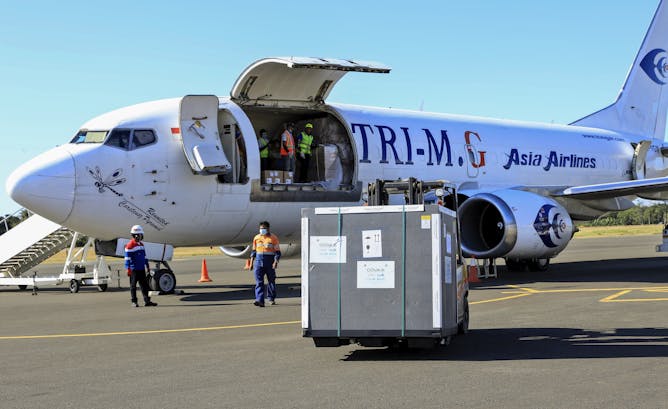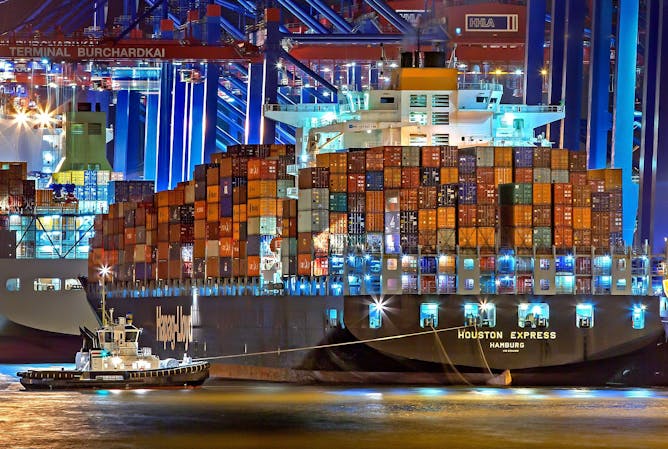|
|
|
|
Plenty of rich countries have made pledges to Covax, the COVID vaccine-sharing initiative. But when the time comes to back up their words, they appear to be looking out for themselves.
Take the UK. It’s promised to send 100 million vaccine doses abroad this year, but so far has sent only 10%. At the same time, it’s just launched a booster programme and is vaccinating teenagers. Covax is 600 million doses short for 2021. In its time of need, it’s really up to countries like the UK to start fulfilling their promises.
At the University of Glasgow, researchers are developing holograms that you can touch. Soon you might be able to shake a virtual colleague’s hand – a bit like in Star Trek’s holodeck.
When it comes to emissions, international shipping is one of the world’s worst industries. Its carbon footprint is equal to the whole of Germany. Thankfully there are many ways it could become greener.
|

|
Rob Reddick
Commissioning Editor, COVID-19
|
|

A shipment of Covax doses arrive from the US in Timor L'este.
Antonio Dasiparu/EPA-EFE
Rory Horner, University of Manchester
The vaccine-sharing initiative is still without its biggest donor – India – while rich countries are diverting spare doses towards youth and booster programmes.
|

Holograms with a sense of touch are being created at Glasgow University.
Design_cells/Shutterstock
Ravinder Dahiya, University of Glasgow
It could be the first steps towards a Star Trek-style holodeck.
|

Container ships transport millions of tonnes of goods across the planet.
Julius_Silver/Pixabay
Simon Bullock, University of Manchester
The shipping sector’s emissions are equivalent to some industrial countries: here’s some innovative ways to help reduce them.
|
Environment + Energy
|
-
James Dixon, University of Strathclyde
National road pricing systems are being proposed, but what are the options?
-
Natascha Radclyffe-Thomas, Glasgow Caledonian University
More and more students want their universities to lead the way on sustainability issues. But are institutions doing enough to produce industry leaders who can meet that challenge?
-
Danita Catherine Burke, University of Southern Denmark
Promoting dialogue among Arctic states and peoples has been a great success, but the council must now adapt to tackle new and emerging challenges in this fragile region.
|
|
Politics + Society
|
-
Amelia Hadfield, University of Surrey
After Brexit, COVID, Afghanistan and more, a look at where the EU stands on key issues.
-
Christoph Bluth, University of Bradford; Owen Greene, University of Bradford
Diplomacy is needed to head off an arms race between North and South Korea.
-
Precious Chatterje-Doody, The Open University; Ilya Yablokov, University of Sheffield
Russia’s state broadcaster works hand-in-hand with the Kremlin to push the party line.
|
|
Science + Technology
|
-
Mike Reddy, University of South Wales
The mass-market computer pioneer leaves behind a legacy of accessible, far-sighted if not always successful products.
-
Oliver Hitchens, University of Surrey
The rocket engines that lauched Apollo 11 towards the moon had 5,600 parts each. 3D-printed equivalents have just 40.
|
|
Business + Economy
|
-
Lorenzo Kurras, WHU – Otto Beisheim School of Management; Sascha L. Schmidt, WHU – Otto Beisheim School of Management
Sponsorship is key to holding some of the most popular events in the world.
-
Christina Philippou, University of Portsmouth
More cups, more goals, more money?
|
|
|
|
| |
Featured events
|

|
— Belfield, Dublin, Dublin, 4, Ireland — University College Dublin
|

|
— Strand, London, London, City of, WC2R 2LS, United Kingdom of Great Britain and Northern Ireland — King's College London
|

|
— The University of Manchester, Oxford Road, Manchester, Manchester, M139PL, United Kingdom of Great Britain and Northern Ireland — University of Manchester
|

|
— The University of Manchester, Oxford Road, Manchester, Manchester, M139PL, United Kingdom of Great Britain and Northern Ireland — University of Manchester
|
|
|
|
| |
| |
| |
| |
| |
|
|
|
|
|
|
|